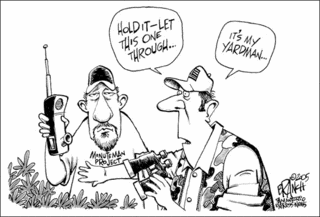Is the black helicopter overhead coming for me?I just got through viewing two hours of a DVD entitled “In Plane Site,” produced by Dave

von Kleist, a San Francisco TV/radio newsman-turned-conspiracy-theorist, concerned exclusively with the 9/11 attacks. The presentation—a collection of slo-mo shots of the filmed attacks and some basic factual research (dimensions of a Boeing 757, etc.)—was not conclusive by a long shot, but . . . . well, it
was interesting and thought provoking. Von Kleist’s contention is that the attacks were not “as advertised. ” If they weren’t, then the conspiracy before us, is:“
Who prompted the attacks? How? Why?” Von Kleist doesn’t venture to answer these questions, but
others do—if only indirectly and by innuendo--a too-frequent habit of conspiracy advocates and why I find them less than credible.
Is Able-Danger connected? Frankly, I wouldn't have bought von Kleist’s DVD had I not happened to catch
Congressman Curt Weldon (R-Pennsylvania) on C-Span, briefing the press on September 15th. He described Army Lieutenant Colonel Anthony Schaffer’s involvement in the Defense Intelligence Agency’s “
Able-Danger” task force (now defunct). Representative Weldon, not known to be a shaky-flaky type, is currently protecting Schaffer who is being encouraged to blow the whistle on what appears to be a clear cover-up of
Able-Danger’s 9/11-related intelligence revelations.
In brief - the DIA “Able-Danger” Project: Using mostly open-source analytical techniques, Schaffer said the project identified several of the 9/11 terrorists more than a year before the attack, and associated their activities with upcoming attacks. He decided to alert the FBI about the dangers his project had uncovered. For reasons yet to be explained, the DIA nixed this sharing of intelligence with the FBI. A few months later, when Schaffer was on a covert mission in Afghanistan in 2002, he personally briefed a group of 9/11 Commission staff members about
Able-Danger’s findings. The puzzling question is why this vital intelligence never made it into the Commission's final report. More puzzling and alarming was Schaffer’s discovery, upon his return to the DIA, that not only had the project been mysteriously shut down, but all of his office's extensive records and research had been "routinely" destroyed. When Schaffer inquired of his two-star boss, he was ordered emphatically to “drop it.” Since July, Congressman Weldon has been fully engaged and is unilaterally (so far unsuccessfully) trying to get the 9/11 Commission to respond to a simple question: “
Why didn’t you include the findings of Able-Danger in your report?”
Self-analysis: My correspondents, friends, and acquaintances—sometimes to their exasperation—know me to lean very heavily to the side of skepticism when it comes to conspiracy theories. It’s true, probably because I’ve been trained to look for facts before believing allegations.* Furthermore, as a general principle, I find it hard to believe that large groups of people, especially government bureaucrats, are clever or coordinated well enough to keep secret massive number of details in the spectacular plots such as are alleged in the JFK assassination, the Roswell Incident, or 9/11—especially when you consider the hoards of reporters and bloggists hovering about--all hungry for a Watergate-type scoop. Not one whistle blower has come forward to expose the alleged government cover-ups of these spectacular events. Von Kleist's DVD and Congressman Weldon have caught my attention, because the conspiracy-theorists are alleging that 9/11 was carried out by people other than Islamic radicals--an outrageous allegation that should be put to rest if possible.
* A
British author, Jeffrey Hale, defines my “academic mindset” this way:
The idea that particular groups of people meet together secretly . . .to plan various courses of action, and that some of these plans actually exert a significant influence on particular historical developments, is typically rejected out of hand and assumed to be the figment of a paranoid imagination. The mere mention of the word 'conspiracy' seems to set off an internal alarm bell which causes scholars to close their minds in order to avoid cognitive dissonance . . . .
O.K., now that I’ve confessed to a certain degree of rigid mind-set, I also freely concede to his description of people who do act secretly and in concert with others in order to promote their own interests:
At any given point in time, there are dozens if not thousands of competitive political and economic groups engaging in secret planning and activities, and most are doing so in an effort to gain some advantage over their rivals among the others. Such behind-the-scene operations are present on every level, from the mundane efforts of small-scale retailers to gain advantage [over their competitors] by being the first to develop new product lines, to the . . . attempts by rival secret services to penetrate and manipulate each other. . . .
Now that I have acquired a more balanced psychoanalytical perspective, it's time to do a light examination of the subject, to see whether we ought to take a closer look at 9/11/2001. In doing so, I confess a certain tension building: The question is already beginning to gnaw on me: “
What if I discover that the press accounts of the 9/11 attacks were not ‘as advertised?' ”
A Brief Survey
As a reminder, perhaps the oldest unsolved conspiracy theory of note are the circumstances surrounding the death of the Jewish prophet, Jesus of Nazareth. After almost 2,000 years, no one has been able to satisfactorily or conclusively explain the mystery of Jesus’ disappearance following his execution and interment. Unfortunately for many of us, it has been explained away by yet another mystery (
transubstantiation), spurring not only continuous debate and conflict among rival religions, but established the Catholic Church and all the splinter groups that followed.
The Roswell UFO wreckage,1947: Controversy still swirls around the alleged wreckage of a crash-landed UFO and the discovery of at least one injured other-world alien o

n a ranch near Roswell, New Mexico. This alleged event became a instant conspiracy-theory event when the local newspaper reported its findings, which were then denied almost a day later by the U.S. Air Force. The Roswell Incident still provides grist for the conspiracy mill in the form of endless TV “documentaries.” It also provides a modest income to the folks who run the “Alien Museum” in downtown Roswell. (Between 1951 and 1954, I attended New Mexico Military Institute in Roswell--that was just a four years after the alleged event--but I never saw an alien, unless it was the dreaded upperclassman known as “Blackie” from Lawton, Oklahoma; “Blackie” tormented and hazed me for nine months during my first cadet year as a “rat.”) The local rancher’s discovery and the later revelation of the secret Area-51 range in nearby Nevada have spawned variations on the basic conspiracy question: “
Why is the government covering up its knowledge of UFOs and related events?”
JFK’s assassination, November 1964: Within hours of Jack Ruby’s murder

ing Lee Harvey Oswald with a point-blank shot in the gut during his transfer to a secure facility from Dallas police department, conspiracies instantly became an industry—mainly because Oswald continued to claim, even seconds before Ruby murdered him, that he was a “patsy” and had not shot at or killed the president. Questions arose at once. “
Why did Ruby, small-time shady owner of a seedy nightclub, undertake the assassination of the assassin on his own?” Then there was Oswald’s strange life after his discharge from the Marines—renouncing his U.S. citizenship, settling in the U.S.S.R. after marrying a Russian girl, declaring himself a Communist,

making trips to the Soviet Embassy in Mexico City, and a secret trip to Cuba. Without Oswald to ply with these questions, many normally clear-thinking people became skeptical of LBJ’s Blue Ribbon Commission that blamed the deed on one odd young man, who launched one very savvy bullet from an old mail-order Czech-made bolt-action army rifle from an unlikely distance, not only killing JFK instantly, but wounding the accompanying Texas governor. Oliver Stone’s 1991 epic attempted to throw in as many of the theories still around 30 years later, but Stone’s conclusion that the CIA was the culprit didn’t put an end to the mystery. The question still circulates:
"Who really killed JFK and why?"9/11/2001, the World Trade Center, Tuesday morning
Here's a summary of the “as-advertised” event as outlined in the 9/11 Commission Report:
Mohammed Atta and 18 other Al Qaeda terrorists hi-jacked four Boeing 757 commercial aircraft at the same times from separate airports in Boston (Logan Airport); D.C. (Ronald Reagan Airport); New Jersey (Newark International); and Herndon, Virginia (Dulles Airport). When the airplanes were airborne, five terrorists on each flight, (except for the Boston flight, which lacked a fifth), using box cutters, hijacked the flight crew and commandeered the aircraft by taking over the flight controls. The first strike was on the south tower of the WTC. The second was on the north tower 15 minutes later. The third was on the Pentagon. The fourth, almost 45 minutes late taking off from Boston, was circling back toward Washington with the White House or the Capitol Building as its target, when passengers heroically prevented the terrorists from completing their plan, causing the plane to crash into an open field near Shanksville, Pennsylvania, killing all on board. President Bush, visiting an elementary school in Florida, was advised after the second plane struck the WTC, then waited seven minutes before leaving the school room. All 4,873 IFR flights aloft and all other air traffic were ordered grounded for almost three days following the attack, except, as it was later revealed, special flights that exited the U.S. carrying resident-members of the Saudi royal family. President Bush announced that the responsibility for the attack was Osama bin Laden with training headquarters in Afghanistan. Osama bin Laden confirmed his complicity in TV tapes. In November U.S. and allied forces attacked Afghanistan, scattering Osama and his Taliban friends into the mountains. A pro-western government was elected a year later. The U.S. and Pakistan have been searching for Osama bin Laden ever since.
The 3 main variations on the 9/11 theme:
Except for the U.S. explanation for the attack (variant #1 below), the reasons for the attacks in variants #2 and #3 are less developed in specifics, but whispered in innuendos and implications. They all are rooted in the scenario that President Bush and his political neo-cons, together with “corporate oil interests” and in league with the Bush family's royal Saudi friends, actually prompted and underwrote the attacks.
Variant (#1): That Osama bin Laden’s recruits were trained, coordinated, and used in the manner widely reported in the world press; that is, the passengers, crew and hijackers on commercial airliners were sacrificed in airliners used as piloted missiles. Of course, conspiracy buffs reject this explanation.
Doubters point out problems with this variant: 
The photos of the bellies of the airliners that seem to show an unusual pod; pronounced flashes, just before the airliners impact the towers, are theorized to be triggering devices of "bunker busters" that explode just before impact. In the case of the Pentagon impact, the outer wall impacted by the alleged Boeing 757 showed no airplane, only a ball of flame; one camera showed a date-time stamp of 9/
12/01, one day after the actual event; news TV shots show the outer wall with a 16-feet diameter hole--much too small to account for

an aircraft with a wingspan of 124 ft. and a vertical stabilizer height of 44 ft.; the outer wall around the 16-ft. hole did not collapse until approximately 30 minutes after the impact; no debris of the aircraft was found inside or outside the impact site; no human remains were found. In the case of the Shanksville crash, the impact site (photographed soon after the impact) is questionably too small and is said to be showing grass growing on the sides of the cavity; furthermore, they point out that there are no signs of debris near or around the site.
Variant (#2): That a secret cabal of conspirators, authorized and empowered by the president of the United States, using hijackers and civilian aircraft as “diversions,” directed the attacks with other military assets: A remotely controlled F-16 fighter (not a commercial Boeing 757), rigged with a “bunker buster” bomb supposedly attacked the Pentagon, and three other Boeing 757-type aircraft, also rigged with “bunker buster” bombs and special electronic guidance pods on their bellies, were involved in the WTC and Shanksville impacts.
Problems with this variant:
I haven’t discovered how the conspiracy theorists explain the obvious: If the U.S. military was involved, where was it carried out (the rigging of aircraft with electronics and special bombs)? And what happened to the passengers in the commercial aircraft we know disappeared--if not into their targets, then what happened to them? And, as I always ask, how is it that these extensive preparations involving hundreds of people were made in absolute secrecy--not producing a “Deep Throat” or even one low-level whistle blower?
Variant (#3): That someone outfitted the two towers and the smaller adjacent 42nd street building with explosives sometime before the aircraft strikes; this, as best I can discern the theory, was necessary to insure that the powerfully strong towers would collapse under attack by the large Boeing 757 aircraft—that is, the aircraft strikes in and of themselves would not guarantee their collapse.
Problems with this variant:
The theorists present scant evidence to support this, except for some news sound bites shortly after the collapse of the twin towers, with voices saying they heard “explosions,” before the actual collapses similar to commercially controlled implosions of large, multistoried buildings. And purportedly, the building manager of the building at the foot of the WTC towers, was taped saying: "
I pulled the plug on it." While this scenario is conceivable, it seems highly implausible that crews of expert dynamite riggers would have spent hours planting explosives in these skyscrapers without some non-plotter not noticing and reporting the activity.
The motive for the U.S. attack on itself--according to conspiracy theorists: To occupy and colonize the Middle East, thus creating not only expanded and secure oil and natural gas resources, but also obtaining the following beneficial outcomes:--Provide a powerful geopolitical position from which the U.S. would be able to influence the direction of political and economic events in the Near and Middle East,
--while exercising an enormously powerful fortress on the doorsteps of Russia and China, from which defensive and offensive military-political campaigns could be launched for the next 100 years
--Islamic radical governing Iran would be neutralized
--Russia’s historic desire to move to blue waters to their southern underbelly (control of the Turkish straits and the Bosporus Straits out of the Black Sea) would be blocked or “controlled.”
--Saudi Arabia and the Emirates would be grateful and obedient for American military and economic protection, while guaranteeing the U.S energy sources at stable, reasonable prices, through an OPEC now dominated by the U.S. and that would continue the Saudi’s firm-fisted price control and production policies.I'm very partial to this
Bismarckian thinking of the conspiracy-theorists (their thinking happens to coincide with some of the thinking attributed to those dreaded "neo-cons"). If the U.S. could pull it off, it’d solve many future problems for decades to come. Furthermore, the idea seems to comport with the general thinking that “neo-cons” like Paul Wolfowitz and fellow-thinkers are said to favor and have been promoting for many years. First, even if such a neat, epic scheme exists, I am suspicious that Mr. Wolfowitz or the combined efforts of conspirators in the Bush-Saudi dynasty could successfully coordinate the thousands of people and details that would be required to execute the plan over
any given span of time. And once more, I find it hard to believe that the massive planning--of such sweeping, epic proportions--would not have come under the scrutiny of the "fourth estate" by now. Of course, the conspiracy-theorists will answer my objection by emphasizing that The Master Plan has been under the most secure lock and key governed by extraordinary classification policies.
Ummmm . . . maybe! But does anyone remember Daniel Ellsberg, the guy who came upon and photocopied the “Pentagon Papers” in 1973? This document was also a super-sensitive, highly classified set of papers that contained the details and “the real story" of U.S. involvement in and planning (military, economic, and political) for the Vietnam--including post-victory planning. Daniel Ellsberg, a mid-level government employee, copied and delivered it to the
Washington Post. Today, if there exists a similar “Grand Scheme” for a new American "imperialism" under heavy lock and key, surely it’s just a matter of time before it makes its way into the public domain.
Do the conspiracy-theorists have solid grounds on which to pursue the conspiracy angles? My old “rigid academic mindset” still whispers to me, “
Don't believe them without solid evidence.” However, I freely admit that today I am a little more sensitive to good, sensible questions that are ignored or left unanswered by responsible government officials.
In particular, I'm very concerned about the Able-Danger affair. With the facts we now have, something just doesn't smell right. Does my concern signify that I have unwittingly joined the ranks of the conspiracy theorists?
During my stint in the DIA in the Pentagon I recall the impenetrable wall called "
need to know" could be slammed shut at the drop of a hat--and it was always a hat belonging to some general. The highlight of Colonel Tony Schaffer's last days in DIA, according to his own testimony, was that a "two-star general" told him to back off and forget Able Danger. This is obviously one of those unanswered questions: "
Why was Able-Danger intelligence ignored?" And
"Why was the DIA project shut down, in light of our new watchfulness under the Homeland Security Act?"There's no question about it-- many questions are left begging for answers, but in the meantime I am not going to succumb to the paranoia that the helicopter whirring overhead my house at one-o’clock in the morning is bringing the secret police to lock me up--some part of my brain tells me that it's our local hospital medevac helicopter coming from or going to Tucson with an unfortunate accident or heart attack victim.


 ntion of the American people last April with his Minuteman Project, movement toward border control and immigration reform is finally beginning to surface, even if at a tortoise-like pace. This legislation recognizes that the first critical component in devising realistic immigration reform is our ability to know who are and who are not legal residents. Sincere parties to the reform movement agree to this logic, and most agree that this would be most efficiently accomplished by issuing National ID cards.
ntion of the American people last April with his Minuteman Project, movement toward border control and immigration reform is finally beginning to surface, even if at a tortoise-like pace. This legislation recognizes that the first critical component in devising realistic immigration reform is our ability to know who are and who are not legal residents. Sincere parties to the reform movement agree to this logic, and most agree that this would be most efficiently accomplished by issuing National ID cards. roviding free social, educational, and medical welfare to illegal immigrants.
roviding free social, educational, and medical welfare to illegal immigrants. n "acceptable form of evidence." Even among us rank and file “Joe Voters” in Arizona, Proposition 200 was a very welcome and easy-to-understand no-brainer.
n "acceptable form of evidence." Even among us rank and file “Joe Voters” in Arizona, Proposition 200 was a very welcome and easy-to-understand no-brainer. implemented, the Governor directed her Attorney General to seek a temporary injunction. After her blocking action expired a month later, the Governor has continued to drag her feet--for example, she refuses to define for state employees what form(s) of identification they should ask for and accept as "appropriate" forms of eligibility. Should hospital emergency rooms deny patients services if they aren't legal residents and/or citizens? Or should public schools stop accepting the children of "undocumented" immigrants? For that matter, should the children who have been enrolled for several years be disenrolled if their parents can't present "appropriate" forms of eligibility? Admittedly, these are sticky questions. So implementation of Proposition 200 remains in limbo--many Arizonans say their will is being deliberately thwarted.
implemented, the Governor directed her Attorney General to seek a temporary injunction. After her blocking action expired a month later, the Governor has continued to drag her feet--for example, she refuses to define for state employees what form(s) of identification they should ask for and accept as "appropriate" forms of eligibility. Should hospital emergency rooms deny patients services if they aren't legal residents and/or citizens? Or should public schools stop accepting the children of "undocumented" immigrants? For that matter, should the children who have been enrolled for several years be disenrolled if their parents can't present "appropriate" forms of eligibility? Admittedly, these are sticky questions. So implementation of Proposition 200 remains in limbo--many Arizonans say their will is being deliberately thwarted. ith Bill Richardson, Democrat Governor of our neighbor New Mexico, this summer declared a “state of emergency.” She still hasn't explained to us and we are not sure what that move was supposed to accomplish (for example, the National Guard hasn't been called to man the border--in fact, at the border, it's business as usual), but Proposition 200 still goes unimplemented, by virtue of benign neglect. What we suspect was tactic designed to the Arizona masses, Governor Napolitano made the news for a couple days by sending U.S. Attorney General Gonzales in Washington a bill for a whopping sum she calculated Arizonans have paid to maintain illegal immigrants. So far, General Gonzalez has not responded with the hopeful words, "The check's in the mail" and in the meantime the “invasion” continues--we Arizonans continue to pay for the "invaders."
ith Bill Richardson, Democrat Governor of our neighbor New Mexico, this summer declared a “state of emergency.” She still hasn't explained to us and we are not sure what that move was supposed to accomplish (for example, the National Guard hasn't been called to man the border--in fact, at the border, it's business as usual), but Proposition 200 still goes unimplemented, by virtue of benign neglect. What we suspect was tactic designed to the Arizona masses, Governor Napolitano made the news for a couple days by sending U.S. Attorney General Gonzales in Washington a bill for a whopping sum she calculated Arizonans have paid to maintain illegal immigrants. So far, General Gonzalez has not responded with the hopeful words, "The check's in the mail" and in the meantime the “invasion” continues--we Arizonans continue to pay for the "invaders."
































 I passed up the three water-oriented military recruiters in Denver--I shuddered at the thought that, after basic training, I'd have to go with my fellow trainees into one of those seedy tattoo parlors outside the military bases. Tattooing, I understood, was an obligatory rite of manly passage for any young sailor or Marine. I wasn't about, just for the sake of camaraderie, to bear "Mom" or a skull and crossbones on my shoulder the rest of my life! I heard that the Air Force had no such a tradition of tattooing its enlistees--so it was into the wild blue yonder after signing a
I passed up the three water-oriented military recruiters in Denver--I shuddered at the thought that, after basic training, I'd have to go with my fellow trainees into one of those seedy tattoo parlors outside the military bases. Tattooing, I understood, was an obligatory rite of manly passage for any young sailor or Marine. I wasn't about, just for the sake of camaraderie, to bear "Mom" or a skull and crossbones on my shoulder the rest of my life! I heard that the Air Force had no such a tradition of tattooing its enlistees--so it was into the wild blue yonder after signing a




